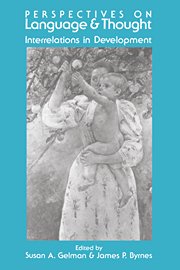Book contents
- Frontmatter
- Contents
- Preface
- List of contributors
- I INTRODUCTION
- II RELATIONS BETWEEN WORD LEARNING AND CATEGORIZATION
- III LOGICAL, CAUSAL, AND TEMPORAL EXPRESSIONS
- 7 Language and the career of similarity
- 8 The matter of time: Interdependencies between language and thought in development
- 9 Constraints on the acquisition of English modals
- 10 Acquisition and development of if and because: Conceptual and linguistic aspects
- IV THE ROLE OF SOCIAL INTERACTION
- Author index
- Subject index
8 - The matter of time: Interdependencies between language and thought in development
Published online by Cambridge University Press: 05 January 2012
- Frontmatter
- Contents
- Preface
- List of contributors
- I INTRODUCTION
- II RELATIONS BETWEEN WORD LEARNING AND CATEGORIZATION
- III LOGICAL, CAUSAL, AND TEMPORAL EXPRESSIONS
- 7 Language and the career of similarity
- 8 The matter of time: Interdependencies between language and thought in development
- 9 Constraints on the acquisition of English modals
- 10 Acquisition and development of if and because: Conceptual and linguistic aspects
- IV THE ROLE OF SOCIAL INTERACTION
- Author index
- Subject index
Summary
As the chapters in this book testify, the relation between language and thought in development has been conceptualized in many different ways. As the question of how children acquire language has come into focus in the past 25 years, theorists have argued either that language depends on cognition or the opposite – that cognition depends on language. This argument has taken many forms (for some of the forms and their ramifications see Cromer, 1988; Johnston, 1985). The classical views are reviewed elsewhere in this volume. In order to put my own conception of this relation into perspective it is revealing to consider briefly the many variations that are implicit in current psychological and linguistic models.
First, there is the strong cognitive determinism position attributed to Piaget – that acquiring and using language depends on the prior acquisition of supportive cognitive structures. Despite many efforts to find empirical support for this general proposition, there is little hard evidence that specific cognitive achievements are prerequisites of the acquisition of specific linguistic developments. Second, in the linguistic determinism position (known as the Sapir–Whorf hypothesis), thought, in its final forms, is held to be a function of the particular system of language that an individual has learned to use. Although both weak and strong forms of this position have been generally discredited in the recent past, a revival of sorts is under way (see Lakoff, 1987; Lucy, 1985; Silverstein, 1985). Third, the position that cognition is language – that the two are functionally equivalent – was implied in Watsonian behaviorism, which held thought to be covert verbalization.
- Type
- Chapter
- Information
- Perspectives on Language and ThoughtInterrelations in Development, pp. 278 - 318Publisher: Cambridge University PressPrint publication year: 1991
- 11
- Cited by

